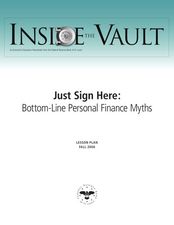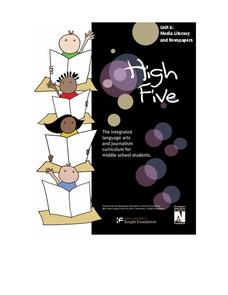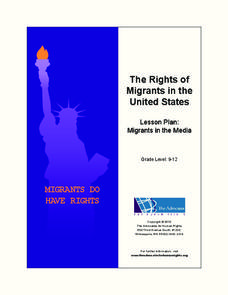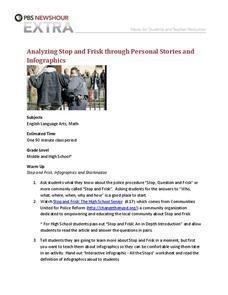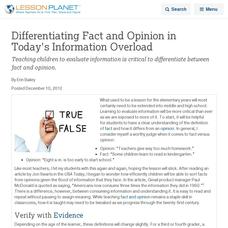Southern Poverty Law Center
Evaluating Online Sources
All sources are pretty much the same, right? If this is how your class views the sources they use for writing or research projects, present them with a media literacy lesson on smart source evaluation. Groups examine several articles,...
Newseum
Evidence: Do the Facts Hold Up?
Sometimes it's hard to escape bad information! Pupils learn the E.S.C.A.P.E. method for evaluating news sources and complete a worksheet to assess a news article using their new skills.
PBS
What Is Newsworthy?
What is news? What is newsworthy? Who decides and what criteria do they use? Introduce young journalists to the basics of reporting with this media literacy lesson.
Federal Reserve Bank
Lesson 2: In the Aftermath
Don't wait for a crisis to get your finances together. An economics lesson demonstrates the importance of understanding crucial documents, banking basics, and financial tools with the focus on Hurricane Katrina in 2005 and its effects.
Newseum
Can I Trust the Creators?
It's easy to find information at the click of a mouse, but is it trustworthy? Pupils learn about the E.S.C.A.P.E. acronym for evaluating sources. Next, learners read a news story and evaluate its sources to determine credibility. Last,...
Teaching Tolerance
Social Media for Social Action
Engage in activism, not slacktivism! Scholars discuss social media and the Internet as tools for social change. Next, they engage in a close reading strategy called Thinking Notes as they read an article about social media activism.
Ogden Museum of Art Education Department
Literacy and Landscapes
As the saying goes, art often imitates life ... and literature! A series of activities designed to accompany a visit to the Ogden Museum of Southern Art encourage writers to find inspiration in various landscapes. The lesson includes a...
King Country
Lesson 26: HIV/AIDS & Other STDs - Day 3: HIV/AIDS
The third lesson plan in the three-part series on HIV/AIDS and other STDs considers how these diseases are passed, how to protect against them, and risky and safe behaviors. The discussion of condom use and sexual behaviors are explicit.
PBS
NOVA Cybersecurity Lab Lesson Plan
Don't be fooled by cyber scams! An informative lesson teaches techies about cybersecurity. They watch videos, play a game, and engage in discussion to improve their understanding of online safety.
iCivics
Mini-Lesson: The Incumbent Advantage
Does the person running for re-election have an advantage over the challenger? Scholars explore the concept of incumbent advantage during elections using an informative mini-lesson explaining the legislative branch. In pairs, they...
Curated OER
Lesson: Skin Fruit: Ideas of Empathy in Janine Antoni's Work
Kids get artistic as they explore the impact of art materials, sculpture, and performance. They discuss the work of Janine Antoni and then create a performance piece that reflects social or global issues they feel strongly about. The end...
Curated OER
Just Sign Here: Bottom-Line Personal Finance Myths
Students explore budgeting myths. In this personal finance lesson, students complete a series of activities that help them recognize the pros and cons of credit. Students also discover the process for obtaining loans. This lesson...
American Press Institute
High Five: Media Literacy and Newspapers
Teach the five different types of media with the first of three in a media literacy unit. Learners create and propose a final newspaper project, which must address information covered throughout the unit.
University of Wisconsin
BEAM: Background, Exhibit, Argument, Method
Thinking of assigning a research paper? Get writers off on the right foot with a activity that introduces the BEAM research model. Writers brainstorm the background of their topic, explicate the aspects of their topic, consider the...
Ontario
Lesson Plan for Media Literacy
Fourth graders analyze posters that communicate an "active living" message, otherwise known as a public service announcement. Children identify techniques that are used in creating media texts including topic, purpose, and...
Channel Islands Film
Sa Hi Pa Ca (Once Upon a Time): Lesson Plan 2
What tools do archaeologists and anthropologist use to learned about what life was like in the past. After watching West of The West's documentary Once Upon a Time that details how scientists use artifacts to establish a history of the...
Advocates for Human Rights
Migrants in the Media
Class members examine two documents—The Universal Declaration of Human Rights and The Rights of Migrants in the United States—and then use reports in the media to assess how well the US is doing in ensuring these rights.
PBS
Technology: Conveniences and Consequences
It's a delicate balance—using technology to improve our lives while still protecting the environment, and ourselves, from the hazards of technology use. Class members examine statistics about the increase in media use, complete a survey...
Museum of Tolerance
Developing Media Literacy
To protect young people from questionable content, many schools limit access. This resource suggests that because learners can so readily avail themselves to unrestricted Internet access, it is vital for 21st century learners to develop...
PBS
Analyzing Stop and Frisk Through Personal Stories and Infographics
How much can you learn about an important topic from a single image? High schoolers analyze an infographic that represents the number of stops performed during the Stop and Frisk police procedure. After building background information...
EngageNY
Interpreting, Integrating, and Sharing Information about DDT: Using Cascading Consequences and Fishbowl Protocol
What is your interpretation? Scholars look at their Cascading Consequences Charts and interpret the information they have gathered. Learners match claims with evidence and then watch a video. At the end, they carry out a fishbowl...
Curated OER
Juggling Fact and Opinion in Today's Information Overload
Teaching children to evaluate information is critical to differentiate between fact and opinion.
Texas Center for Learning Disabilities
Second-Grade Comprehension-Based Intervention
Help your youngsters find meaning in the text they read with this series of five intervention lessons. Offering explicit, step-by-step instructions for walking children through shared readings of leveled books, these...
Curated OER
Finding and Authenticating Online Information on Global Development Issues
Students discover how to find authoritative resources. In this research skills instructional activity, students examine strategies for using the Internet effectively to research global development issues.













